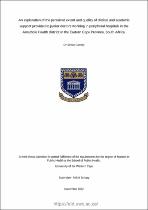| dc.contributor.advisor | Schaay, Nikki | |
| dc.contributor.author | Comley, Simon | |
| dc.date.accessioned | 2023-05-15T12:30:27Z | |
| dc.date.available | 2023-05-15T12:30:27Z | |
| dc.date.issued | 2022 | |
| dc.identifier.uri | http://hdl.handle.net/11394/9972 | |
| dc.description | Master of Public Health - MPH | en_US |
| dc.description.abstract | By the end of 2022, approximately 2 500 South African doctors, having freshly completed their intern years, will have been allocated to hospitals across the country for 2023 so as to complete their compulsory year of community service training before becoming independent medical practitioners. This community service year aims to provide the first official experience of working mostly independently, and is the last phase of training for junior doctors. This programme also ensures that doctors are available in rural and under-resourced areas to supplement the existing staff complement of hospitals or clinics. Since its inception in 1998, the community service programme has had varied responses from the junior doctors and other stakeholders, but one aspect that features consistently in feedback has been the lack of clinical and academic support that they receive in their year of placement. | en_US |
| dc.language.iso | en | en_US |
| dc.publisher | University of the Western Cape | en_US |
| dc.subject | Public health | en_US |
| dc.subject | Community health workers | en_US |
| dc.subject | Eastern Cape | en_US |
| dc.subject | Academic sector | en_US |
| dc.subject | Psychiatric | en_US |
| dc.title | An exploration of the perceived extent and quality of clinical and academic support provided to junior doctors working in peripheral hospitals in the Amathole Health district in the Eastern Cape Province, South Africa | en_US |
| dc.rights.holder | University of the Western Cape | en_US |

